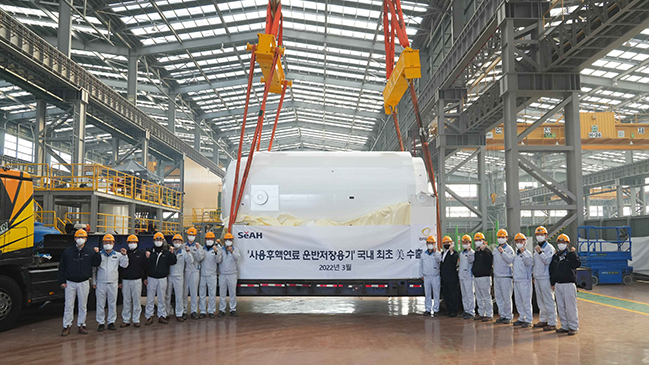SeAH PR
SeAH NEWS 2022-03-07
SeAH Besteel Becomes the First Korean Company to Export the Cask to the U.S.

(Photo: SeAH Besteel celebrates its export of the container for storage or shipment of spent nuclear fuel to the U.S. for the first time among the Korean companies.)
SeAH Besteel is to accelerate its efforts on expanding into the global market for the cask, a container for storage or shipment of spent nuclear fuel, as it will export the completed cask to the U.S. for the first time among the Korean companies.
SeAH Besteel announced on the 7th that the company had won a contract for the supply of 17 casks from Orano TN in September 2019 for the first time in Korea and is going to deliver the initial amount of 3 casks to the U.S., one of the most mature nuclear markets in the world. The cask is used to assure safe transportation and storage of spent fuel from nuclear power plants - it is an essential product that contains the nuclear fuel not only for operation and maintenance, but also teardown of nuclear plants.
The cask SeAH Besteel will deliver this time is to be distributed to the energy companies in the U.S. by Orano TN. SeAH Besteel established a cask mass-production system after having gone through a series of processes, including design and assembly of the product, heat transfer test, etc., as required by the international standards related to the nuclear energy for three years after it won the contract in 2019, to establish the reliability of its technologies. The company plans to deliver the additional amount of the initial product within this year.
SeAH Besteel plans to beef up its capabilities so that it can fully satisfy the demands from the Korean and the global nuclear plant decommissioning market that is expected to grow sharply, using its experiences of stably manufacturing and supplying the additional amounts after delivering the initial products to Orano TN. In fact, the company’s cask manufacturing technology had been verified when the company had participated in a project where it assembled the cask, tested the cask for quality, passed the acceptance test and delivered the cask to Korea Hydro and Nuclear Power working together with Orano TN even before it delivered the complete products this time. Also, SeAH Besteel was designated as the researcher and developer and working with Korea Atomic Energy Research Institute (“KAERI") in a national project on localization of the spent nuclear fuel container for deep geological disposal.
According to Ministry of Trade, Industry and Energy (“MOTIE"), the global nuclear plant decommissioning market is expected to grow to the size of approximately KRW 550 trillion by 2050. Most of the temporary storages in Korea are soon to be saturated as the operation of 12 nuclear plants will have been permanently suspended by 2030, starting with Gori #1 in 2017, thus, the demand for the cask from the nuclear plant decommissioning market is expected to grow.
A person from SeAH Besteel commented that “the manufacturing technology of SeAH Besteel was recognized by the U.S. nuclear plant market that demands the suppliers to satisfy the strict standards as we successfully delivered the initial quantity of the cask. We expect that the cask business will grow into the new growth engine for the non-automotive special steel segment as we will win more contracts from the Korean and the global nuclear power plant decommissioning market."
List
